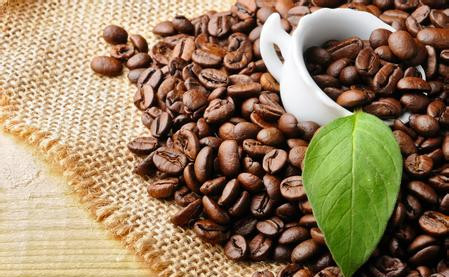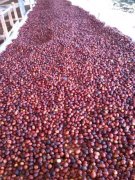Why Blue Mountain Coffee Is So Special
What makes Jamaica Blue Mountain Coffee so special?
One might ask what makes Jamaica Blue Mountain coffee so special? The answer is everything about it.
The best growing conditions in the world
Jamaica's weather, geology and topography combine to provide an ideal location. Designated Jamaica Blue Mountain Coffee can only be grown in the Blue Mountains region, north east of Kingston on Jamaica Island. Coffee is grown on hills up to 1800 meters (almost 6000 feet) high, which is quite high for Arabica, and the hills are very uneven, making the harvesting process very difficult (coffee is harvested almost exclusively by women). The trees are mainly small seed "Geisha High Bred" type. Seeds from these trees have been exported to other countries such as Hawaii, Kenya, Papua New Guinea and elsewhere, but there they have been unable to recreate the flavor of Blue Mountain coffee beans.

In the steep and high altitude mountains, carefully cultivated and harvested, all Jamaica Blue Mountain coffee is ground, tasted and distributed by the Jamaica Industry Association. The coffee in the cup tastes very clean, and it is one of the sweetest coffees in the world. This taste has been described by Jim Reynolds in Peet Coffee and Tea: "The best example of Jamaica Blue Mountain coffee is its aromatic, smooth, dense"..."It gives me a feeling of gem-like quality. It's precious like a jewel. It's complex, but it's very mild, it's sweet, it's very alcoholic. You must taste it in order to know what I am talking about." The unique growing conditions and care taken in all production processes make Jamaica Blue Mountain Coffee famous.
Jamaica is one of the world's smaller coffee producing regions, harvesting about 40000 bags-60 kg/sack a year (Jamaica Blue Mountain coffee is actually shipped in 70kg barrels, they are the last country to still use this traditional packaging method, but their production is 60kg/sack, because that is the international standard for coffee production measurement). Compare Brazil, the world's largest coffee exporter, with annual production at 3000000 bags-60 kg/sack.
The Japanese invest heavily in Jamaica's Blue Mountain coffee growing regions and take a 90 percent share of production each year. The rest of the world must bid for the remaining 10 percent, or 3500 barrels. Real Blue Mountain coffee has a unique flavor that makes it the most expensive coffee in the world. It is in extremely high demand, so there is some shortage in the market.
Unique growth conditions
The unique growth conditions give rise to the unique flavor of Blue Mountain Coffee, which also makes it one of the "best coffee". Global 100% Pure Blue Mountain Coffee is produced in a specific area of the Blue Mountains in eastern Jamaica. Every step of its cultivation period and processing process has passed the strict quality management standards of the Jamaica Coffee Industry Bureau before it can be certified as "Pure Jamaica Blue Mountain Coffee."
The abundant rainfall, fog and low temperature throughout the year, the average temperature of about 20℃, fertile new volcanic soil and other special conditions in the Blue Mountain constitute a good growth environment for Blue Mountain Coffee. Located at an altitude of 2500 to 5000 feet, it has a distinctive, slightly acidic taste, without any irritation or discomfort. Seedlings are cultivated in nurseries for about 2 years, organic fertilizers are used during their growth, and they are harvested manually one by one. All processing, roasting and packaging must meet the high standards set by the Jamaica Coffee Industry Board.
Typica is the best variety in Arabica. While most coffee producing countries prefer to grow only other varieties with higher yields but lower quality, Jamaica prioritizes quality and prefers to sacrifice Blue Mountain coffee production for the best quality.
100% pure Jamaica Blue Mountain coffee, strong attractive elegant flavor, really make other coffee can not catch up with, when after grinding, brewing and tasting steps, but also let its flavor play to the extreme, surrounded by coffee fragrance teaching people not drunk is difficult! Its caffeine content is very low, only about half of other varieties of coffee, in line with modern people's health requirements.
100% pure Jamaica Blue Mountain Coffee combines unique acidity, bitterness, sweetness and alcohol perfectly and evenly, combined with a rich and unique aroma. No wonder coffee lovers all over the world are fascinated by it! The high altitude makes it slightly sour, and the slight bitterness is short-lived and does not remain in the mouth. When it enters the throat, it turns into a slightly sweet feeling. The mellow throat rhyme is even more satisfying.
WALLENFORD-Jamaica Blue Mountain Coffee Development Era
In 1728, coffee was first introduced into Jamaica for cultivation. Due to the suitable soil, climate, light and other conditions in Jamaica, coffee quality was outstanding, and cultivation gradually changed from St. Andrews expands to other regions;
In 1737, Jamaica coffee production reached 83000 pounds per year; over the next 40 years, numerous private plantation owners appeared, until 1800, when Jamaica had 686 coffee plantations;
Due to serf trade, labor costs rose sharply, and the manor owners were overwhelmed by costs. By 1850, coffee plantations had been reduced to 186.
To 1900, Jamaica government formulated the first coffee quality standards, but this standard was resisted by many private estate owners, and finally did not implement;
Since then, due to the lack of quality standards constraints, Blue Mountain coffee exports uneven quality, greatly affecting its international reputation, to 1943, when the Blue Mountain coffee importing country Canada refused to import Blue Mountain coffee;
In 1944, the Jamaica government realized the necessity of regulating the Blue Mountain coffee industry and reformulated three regulatory proposals for the Blue Mountain coffee industry: ① centralized processing of Blue Mountain coffee beans; ② establishment of quality standards for Blue Mountain coffee; ③ establishment of CIB, which is responsible for the organization, management and export supervision of the market;
In 1948, the world-famous Jamaica Coffee Board (CIB) was formally established. At the same time, the Jamaica government enacted the Jamaica Blue Mountain Coffee Industry Management Act. CIB's main responsibility is to improve the quality of Blue Mountain Coffee through management supervision and regain the global reputation of Blue Mountain Coffee. At this time, the definition of Blue Mountain Coffee has been strictly stipulated in the law: (1) Endow four legal coffee plantations including Wallenford with centralized processing of Blue Mountain coffee beans to ensure the quality of Blue Mountain coffee,(2) grow in the Blue Mountain area of 3000-5000 feet, and (3) export classification of Blue Mountain coffee: No.1, No.2, No.3, round beans;
Since 1960, Jamaica's Blue Mountain region, which was hit by hurricanes, destroyed most of the manor facilities and coffee trees. Foreign capital including Japan provided help and also obtained shares and preferential import rights of most manors. At this time, the Jamaica government still retained Wallenford Manor as state-owned in order to maintain the reputation of national treasure Blue Mountain coffee, and made Wallenford Manor synonymous with CIB, shouldering the mission of managing and innovating the coffee industry. Estate managers are also appointed by government departments.
Blue Mountain Coffee Quality Control
① Jamaica Coffee Bureau official registration Logo, used for export Jamaica Blue Mountain coffee certification inspection;
② Jamaica Coffee Bureau (CIB) officially registered BLUEMOUNTAINCOFFEE® trademark, identifying authentic Jamaica Blue Mountain coffee outer packaging;
③ WALLENFORD COFFEE COMPANY Early registered trademark, logo WALLENFORD Blue Mountain coffee outer packaging.
With the globalization of Jamaica Blue Mountain Coffee's reputation and the introduction of Jamaica Blue Mountain Coffee cultivation around the world, many counterfeit Blue Mountain flavored coffees have appeared in the market, seriously affecting the excellent reputation of authentic Blue Mountain Coffee. In recent years, the Government of Jamaica has urged that Blue Mountain coffee be roasted and exported in its original packaging, rather than in green form, to avoid the impact of counterfeit Blue Mountain coffee. The importance of this initiative lies in the ability of the Jamaica Coffee Board to monitor every step of Blue Mountain coffee exports to ensure purity and high quality.
Wallenford Quality Standards
In the Blue Mountain region, where Blue Mountain coffee has a legal production area of 3,000 - 5,000 feet, Wallenford selects only Blue Mountain coffee berries grown above 4000 feet for processing. Not only that, Jamaica's four legal Blue Mountain coffee processing plants Wallenford and MavisBank, Silver Hill, Moy Hall account for 90% of Blue Mountain coffee exports, while Wallenford, Moy Hall produces Blue Mountain coffee known as "Superior Quality"(absolute quality).
Wallenford Estate's extremely strict quality control is also reflected in the product shelf life. Usually, the shelf life of single roast coffee is 12 months, while Wallenford implements the most stringent shelf life of 8 months. Obviously, at the same time of giving up economic benefits, Wallenford has won the high popularity of coffee lovers all over the world. In their evaluation of all Jamaica Blue Mountain estates, Wallenford performs best in quality management, stability, popularity and flavor.
Limited Blue Mountain Coffee Export Quota
According to Jamaica CIB export statistics as of 2004, 85 per cent of the limited Blue Mountain 1 quota was allocated to Japan, 5 per cent to the United States, 5 per cent to Europe and 5 per cent to other countries. However, in the global distribution of authentic Blue Mountain No.1 consumption, according to the International Coffee Association (ICO) statistics, China accounts for 15% of Blue Mountain coffee consumption, which makes the world stunned. The reason is that part of Japan, Australia, Europe Blue Mountain coffee share through direct sales branch exports to China.
The Jamaica government is extremely embarrassed by these differences in export quotas and consumption distribution. Jamaica's coffee industry did not benefit from asymmetric export quotas for Blue Mountain coffee, which kept most of the profits in trading enterprises in countries such as Japan. The key to the shift came in 2005, when Jamaica's agriculture minister made it clear that Blue Mountain coffee should remain more roasted in Jamaica, distributed directly through quotas, and tend to circulate directly from Jamaica to consuming countries.
The means by which the Government of Jamaica relies to change export quotas comes from Wallenford Estate, which is directly controlled by the Government. To obtain Wallenford Blue Mountain 1 quota means that the Jamaica Coffee Board (CIB) endorses quota targets for the country or company.
Important Notice :
前街咖啡 FrontStreet Coffee has moved to new addredd:
FrontStreet Coffee Address: 315,Donghua East Road,GuangZhou
Tel:020 38364473
- Prev

Basic knowledge of fancy Coffee characteristics and Origin of carbon-roasted Coffee
Carbon-roasted coffee, also known as bitter coffee, means that the fire source of roasted coffee is carbon fire, and sometimes special wood is used as fuel. Coffee beans roasted with carbon fire will have wood flavor rather than carbon smell. This kind of coffee comes from Japan, and the pure re-roasting creates the unique taste of Japanese charcoal roasting, which is special, sweet, mellow, full-bodied and extremely bitter. Many
- Next

Basic knowledge of coffee basic knowledge of boutique coffee
1. How to make coffee with excellent flavor at home? A: with regard to the knowledge of brewing coffee, according to the head of a coffee shop, it is necessary to fully master it. Interpreting the essence of coffee requires at least a year of complete professional training, but at present there is no such training environment in China. If you want to brew a good cup of instant coffee at home, here is a little secret.
Related
- Beginners will see the "Coffee pull flower" guide!
- What is the difference between ice blog purified milk and ordinary milk coffee?
- Why is the Philippines the largest producer of crops in Liberia?
- For coffee extraction, should the fine powder be retained?
- How does extracted espresso fill pressed powder? How much strength does it take to press the powder?
- How to make jasmine cold extract coffee? Is the jasmine + latte good?
- Will this little toy really make the coffee taste better? How does Lily Drip affect coffee extraction?
- Will the action of slapping the filter cup also affect coffee extraction?
- What's the difference between powder-to-water ratio and powder-to-liquid ratio?
- What is the Ethiopian local species? What does it have to do with Heirloom native species?

